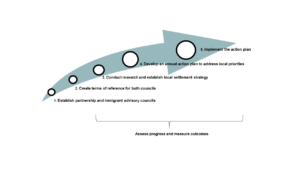About the Western NS Local Immigration Partnership (LIP)
(Version française ci-dessous)
The Western REN recognizes that immigration will continue to play a key role in the economic future of the Western Region. As our region becomes more diverse, it will become more resilient, strong, warm, and hospitable for all residents. Everyone benefits.
This community partnership sees the Western REN bringing together diverse voices and partners to collaborate on innovative and community-driven strategies to meet the changing needs of our region.
Immigration, Refugees and Citizenship Canada (IRCC) has provided funding to the Western REN to lead the region in the creation of a Local Immigration Partnership.
With an emphasis on welcoming, integrating and retaining newcomers, the Western NS LIP is founded with the understanding that:
- Immigration is critical for the future of Canada, Nova Scotia, and our Region with many industries depending on immigration to fulfill their labour needs.
- Municipalities and community groups are best positioned to improve settlement and integration outcomes for newcomers.
- Retention requires an organized and concerted effort by many; and
- The provision of basic settlement services is not sufficient to ensure success – consideration of newcomer needs must be incorporated into all aspects of community planning.
In the fall of 2021, the Western REN designed and delivered 3 surveys to help assess the needs and gaps in local immigration services.
- Labour Needs Survey- targeted employers from our region to assess the impact of labour shortages on their company and how immigration might play a role in helping to fill those needs.
- Community Survey – open to all residents of the Western Region to help us learn more about community priorities, concerns, and attitudes about immigration.
- Immigrant Survey –asked people living in the Western Region who were born outside of Canada questions about their settlement and integration into our communities.
- Infographic Reports
- Summary Reports
The findings from these surveys, research, interviews/consultations as well as input from the LIP members provided the foundation for the 2022-2025 Western NS LIP Strategic Plan. This community-wide plan will help immigrants and newcomers participate, both socially and economically, in the Western Region. The Strategic Plan includes 3 priority areas of focus:
- Attracting talent to our communities
- Employer outreach and support
- Fostering welcoming communities
View or download them here
Western NS Local Immigration Partnership Strategy (English)
Stratégie du Partenariat local en matière d’immigration de l’ouest de la N.-É.
Structure- Committees and Work Groups
Steps in the LIP Process
The illustration below outlines the traditional path that a new LIP will follow:

Partnership Council
The Western NS LIP Partnership Council will provide overall strategic guidance. The Partnership Council consists of 25 members representing organizations/groups which play an important role in building a welcoming and inclusive community. They meet a minimum of four times a year. A small sub-committee of the Partnership Council may meet more frequently to lead operational decisions.
Current members represent the municipalities/towns of the region, business, education, health, financial, community and immigrant services.
Immigrant Advisory Committee
The Immigrant Advisory Committee (IAC) works alongside and advises the Partnership Council to ensure that Western NS LIP’s decisions are grounded in the lived experience of immigrants. The IAC includes 18 immigrants who represent our communities, a range of countries of origin, length of time in Canada, occupational backgrounds, ages and genders.
The Immigrant Advisory Group meets a minimum of four times a year.
Working Groups
Working groups will focus on a specific project/priority item as identified in the Immigration Settlement and Integration Strategy.
Unlike committee meetings, working groups meet as often as needed— sometimes by phone or video conference—to finalize the details of a project or a plan. Work groups stop meeting as soon as the project or plan is complete.
Together the members of the Western NS LIP work together to develop and implement a plan to improve immigrant and refugee settlement in the Western Region.
Contact
Western NS LIP Coordinator
Brenda LaGrandeur
210 Main Street
Yarmouth NS B5A 1C8
902-653-0369
blagrandeur@westernren.ca

Au sujet du Partenariat local en matière d’immigration (PLI) de l’Ouest de la N.-É.
Le Réseau d’entreprises de la région de l’Ouest reconnaît que l’immigration continuera à jouer un rôle clé dans l’avenir économique de la région de l’Ouest. Plus notre région se diversifie, plus elle deviendra résiliente, forte, chaleureuse et accueillante pour toute sa population résidente. Tout le monde y gagne !
Ce partenariat communautaire prévoit que le Réseau d’entreprises de la région de l’Ouest rassemble une diversité de voix et de partenaires pour collaborer à des stratégies innovantes et axées sur la communauté afin de répondre aux besoins de notre région, qui sont en constante évolution.
Immigration, Réfugies et Citoyenneté Canada (IRCC) a accordé un financement au Réseau d’entreprises de la région de l’Ouest afin qu’il dirige la région dans la création d’un Partenariat local en matière d’immigration.
En mettant l’accent sur l’accueil, l’intégration et la rétention des nouveaux arrivants, le PLI de l’Ouest de la N.-É. est fondé sur la reconnaissance des éléments suivants :
- L’immigration est essentielle pour l’avenir du Canada, de la Nouvelle-Écosse et de notre région, car de nombreuses industries dépendent de l’immigration pour combler leurs besoins en main-d’œuvre.
- Les municipalités et les associations communautaires sont les mieux placées pour améliorer les résultats en matière d’établissement et d’intégration pour les nouveaux arrivants.
- La rétention exige un effort organisé et concerté de la part de plusieurs personnes ; et
- La prestation de services d’établissement de base ne suffit pas à garantir le succès — la prise en compte des besoins des nouveaux arrivants doit être intégrée à tous les aspects de la planification communautaire.
Structure — groupes de travail et comités
Les étapes du processus du PLI
L’illustration ci-dessous présente le parcours traditionnel que suivra un nouveau PLI :

Conseil de partenariat
Le Conseil de partenariat du PLI de l’Ouest de la N.-É. fournira une orientation stratégique globale. Le Conseil de partenariat est composé de 25 membres représentant des organisations et des groupes qui jouent un rôle important dans l’édification d’une communauté accueillante et inclusive. Ils se réunissent au moins quatre fois par an. Un petit sous-comité du Conseil de partenariat peut se réunir plus fréquemment pour diriger les décisions opérationnelles.
Les membres actuels représentent les municipalités et les villes de la région, les entreprises, l’éducation, la santé, les finances, les services communautaires et les services aux immigrants.
Comité consultatif des immigrants
Le Comité consultatif des immigrants (CCI) accompagne et donne conseil au Conseil de partenariat afin que les décisions du PLI de l’Ouest de la N.-É. soient fondées sur le vécu des immigrants. Le CCI comprend 18 immigrants qui représentent nos communautés, un éventail de pays d’origine, de durée au Canada, des antécédents professionnels, des âges et sexes.
Le Comité consultatif des immigrants se rencontre au minimum quatre fois par an.
Groupes de travail
Les groupes de travail se concentreront sur un projet spécifique ou un élément prioritaire tel qu’identifié dans la Stratégie d’établissement et d’intégration des immigrants.
Contrairement aux réunions du comité, les groupes de travail se réunissent aussi souvent que nécessaire (parfois par téléphone ou vidéoconférence) afin de finaliser les détails d’un projet ou d’un plan. Dès que le projet ou le plan est terminé, les groupes de travail cessent de se réunir.
Ensemble, les membres du PLI de l’Ouest de la N.-É. travaillent ensemble à l’élaboration et à la mise en œuvre d’un plan visant à améliorer l’établissement des immigrants et des réfugiés dans la région de l’Ouest.
Personne-ressource :
Coordonnatrice du PLI de l’Ouest de la N.-É.
Brenda LaGrandeur
210, rue Main
Yarmouth (N.-É.) B5A 1C8
902-653-0369
blagrandeur@westernren.ca






